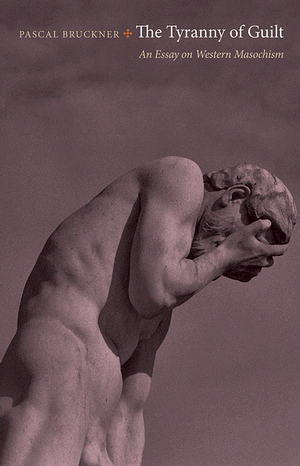[The above is mostly a reading of the text below, with an
occasional aside thrown in for good measure, as they strike me as
relevant. I welcome questions, comments,
or concerns about the material contained in this video.]
This was a powerfully argued, in many ways persuasive, intelligent book that I thought I would end up disliking because of Bruckner’s reputation as a political gadfly in Europe. The subject of the book would also put off a certain kind of American reader who might openly identify with the terms “liberal” or “progressive.” In a time when the French thinker can sometimes be more identified with the obscurantism of someone like Jean Baudrillard, Bruckner much more closely resembles someone like Raymond Aron – which would position him, politically at least, as a moderate in the United States, and on the far right (especially in academic circles) on the Continent.
At the heart of Bruckner’s book, he makes claim that is not meant to provoke so much as it is to get people thinking: Europe has spent too much of the twentieth century apologizing for its mistakes (fascism, the Holocaust, the horrors of Communist) instead of carving out a new path for itself by learning from these mistakes. This apologizing, he says, can become pathologically debilitating. In a time of bracing secularism, Brucker argues that the guilt of original sin never really left us, but that it has been transmogrified – into guilt at the former atrocities of colonialism, slavery, racism, genocide, and many others. Condemnation has become a kind of new civic religion.
Instead of doing the rational thing, which would consist of a dialectical consideration of both our past crimes and an ongoing effort to both correct for them and ensure that they do not occur again, the West (and he’s particularly talking about western Europe here) reverts to a kind of childish narcissism whereby the only way we can savage any shred of former international importance is to wallow in past atrocities.
Whether or not you agree with Bruckner’s thesis, and I had the feeling that I would learn and appreciate it a lot less than I actually did – his writing, even the translation, is extraordinarily well-crafted and his writing convincing. A few of his more minor assertions – like his claim that Baudrillard was positively giddy at the bombing of the Twin Towers on 9/11 – struck me as dubious. The general themes, however, brought me on board more than I expected them to. This is said too often, and of too many writers, but its true of Bruckner: whether you agree with him or not, you’ll certainly come away from this book having been challenged – and done so by a writer who, while far outside the European political mainstream of the intelligentsia, eschews extremism and intelligently questions even his own assumptions.
At the heart of Bruckner’s book, he makes claim that is not meant to provoke so much as it is to get people thinking: Europe has spent too much of the twentieth century apologizing for its mistakes (fascism, the Holocaust, the horrors of Communist) instead of carving out a new path for itself by learning from these mistakes. This apologizing, he says, can become pathologically debilitating. In a time of bracing secularism, Brucker argues that the guilt of original sin never really left us, but that it has been transmogrified – into guilt at the former atrocities of colonialism, slavery, racism, genocide, and many others. Condemnation has become a kind of new civic religion.
Instead of doing the rational thing, which would consist of a dialectical consideration of both our past crimes and an ongoing effort to both correct for them and ensure that they do not occur again, the West (and he’s particularly talking about western Europe here) reverts to a kind of childish narcissism whereby the only way we can savage any shred of former international importance is to wallow in past atrocities.
Whether or not you agree with Bruckner’s thesis, and I had the feeling that I would learn and appreciate it a lot less than I actually did – his writing, even the translation, is extraordinarily well-crafted and his writing convincing. A few of his more minor assertions – like his claim that Baudrillard was positively giddy at the bombing of the Twin Towers on 9/11 – struck me as dubious. The general themes, however, brought me on board more than I expected them to. This is said too often, and of too many writers, but its true of Bruckner: whether you agree with him or not, you’ll certainly come away from this book having been challenged – and done so by a writer who, while far outside the European political mainstream of the intelligentsia, eschews extremism and intelligently questions even his own assumptions.

No comments:
Post a Comment